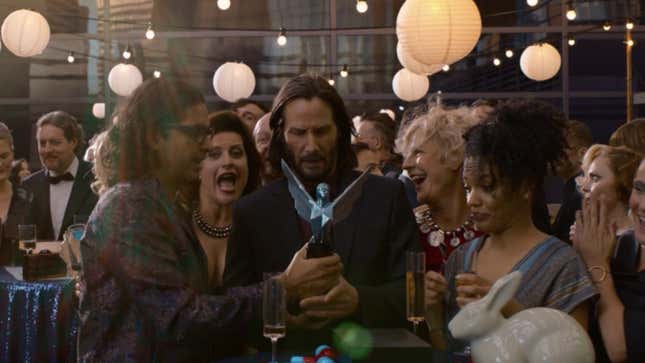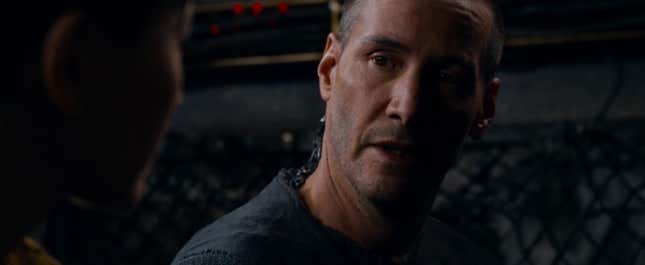
Video games are both important and unimportant in The Matrix Resurrections. They’re mentioned a lot–they play a significant role in the life of Keanu Reeves’ character, Thomas Anderson–but at the same time, the film isn’t particularly interested in games as games. Rather, games serve as a metaphor, and a fascinating one at that. Initially, I thought the film was arguing against the notion that games can be truly meaningful or worthwhile. However, I quickly realized that this was a simplistic misreading, and that if you follow the metaphor through to its logical conclusion, the film is arguing that of course games can matter. Alas, this isn’t a metaphor I can explore much without discussing the film’s plot in some detail. So, if you haven’t seen Resurrections yet and want to go in knowing as little as possible, come back to this piece after you see the film. Everyone else, take your red pills and I’ll see you on the other side.

When we first meet Thomas Anderson in The Matrix Resurrections, he’s a successful game designer, the creator of a series of games referred to as The Matrix Trilogy. For all his achievements, however, Anderson seems both deeply dissatisfied with his life and somewhat dismissive of the adoration others shower upon his work, as if, in spite of its financial success and its legions of fans, it doesn’t actually mean much. When another character asks him what it’s like to be the creator of the famous game The Matrix, he responds self-effacingly, “Yeah, we kept some kids entertained.” It seems he doesn’t have much faith that his work as a game designer actually matters. This is driven home a bit later in a flashback scene, in which we see Reeves’ Anderson holding a Game Award he’s won for The Matrix at a rooftop celebration, a “What the fuck am I doing with my life?” look on his face, moments before he attempts to leap from that same rooftop.

But it was a later scene that first led me to conclude that the film’s whole attitude toward games was somewhat dismissive. Once Thomas–Neo–has once again been awakened in the real world, he realizes that it was only within the collective digital hallucination known as the matrix that he was the creator of The Matrix. It’s an existential crisis on top of an existential crisis. Regarding the way his body has been modified so that the machines can hook him into their system like a battery, he says to Bugs, the resistance agent and pilot who spearheaded his rescue, “If this plug is actually real, that means they took my life–and turned it into a video game.” Bugs replies sympathetically, “They took your story, something that meant so much to people like me, and turned it into something trivial…Where better to bury truth than inside something as ordinary as a video game?”
Taken at face value, it might seem like Neo, and Bugs, and really, the film itself have little regard for the value of video games. However, there’s a lot more going on here. Most importantly. Anderson’s fictional series of Matrix games is explicitly a stand-in for the Matrix films. As filmmakers, the Wachowskis are a lot of things, but subtle, they are not. In Resurrections, directed solely by Lana Wachowski, working without her sister for the first time, whenever we see “footage” of Thomas Anderson’s Matrix games, it takes the form of footage lifted straight from the earlier films. The filmmakers could easily have created footage of fake games that actually look like games, but here, Wachowski et al. are less interested in offering up something that looks plausibly like a game and more interested in driving home for us as viewers that the Matrix games in the film and the Matrix films in our universe are effectively one and the same. This gives them the opportunity to incorporate footage of the earlier films into Resurrections, footage which functions both as flashbacks for Neo, and, in a sense, flashbacks for us, the viewers, as we’re reminded of our own experiences of those films, and what they may have meant to us.
And certainly, the Matrix films have meant a great deal to a great many people. For a long time, it seemed the trilogy’s most significant contribution to the cultural lexicon might have been the notion of being “redpilled,” a term mostly deployed by online conservatives and misogynists to describe when a person “saw the truth” and adopted some aspect of right-wing ideology or some tenet of the “manosphere.” No matter that this plainly went against the political spirit of the films and the trans women who created them, who even cast the brilliant Black leftist philosopher Cornel West in the latter two entries in the trilogy. In recent years, however, a reclaiming of sorts has taken place, as trans people–myself included–have discussed the ways in which Neo’s experiences in The Matrix function as a kind of allegory for trans identity.

However, the radicalism of The Matrix goes far beyond just whatever it might say about queer and trans identity. It’s actually interested in disrupting and dismantling any and all oppressive systems, something that becomes apparent if you watch the first film and note how Morpheus tells Neo that “the matrix is a system,” that the system itself is their enemy, one that has most people’s minds so secure in its grasp that they are not ready to be liberated from it. Many of us are raised in the matrix. During my own upbringing in Illinois and Los Angeles, I absorbed so many bullshit ideas about everything from race to the gender binary to the political spectrum, all of them interconnected and shaping my notion of what was and wasn’t possible. It never even occurred to me to question them or think beyond them, not for a very long time, and when I did have my moments of awakening, they were liberating and empowering, but sometimes painful as well. Despite being trapped in the matrix, Trinity–”Tiffany”—is at least questioning its systems somewhat, as we see when she wonders aloud to Thomas if she had kids because she genuinely wanted kids or because women are “supposed to” want kids. The matrix tries to tell us what it means to be who we are.
So the matrix is a system, one in which humanity is imprisoned by false beliefs about what’s possible. In the films, understanding the nature of the system allows people to accomplish things that are otherwise impossible–by the end of the first film, within the matrix, Neo is flying, no longer constrained by the rules of the system. This is why I think games are an ideal stand-in for the original films within the world of The Matrix Resurrections. Within the world of the films, what is the matrix, after all, but an elaborate MMO, one people don’t know they’re playing but which nonetheless has systems that dictate what is and is not possible? Similarly, most games are made up of interlocking systems that dictate–or try to dictate–how it is that players interact with the game, what we can and cannot do.
When we play a game, most of us are content to approach it as its designers intended, to operate within the systems that the game lays out for us. But like a lot of people, I’m thrilled by the exploits and achievements of players who deliberately break games, or who use the systems to accomplish things that the designers didn’t intend. I love watching speedrunners use the magnet beam in the original Mega Man to glitch through walls and complete stages in a fraction of the time it takes most players, for instance, or seeing them use Breath of the Wild’s physics systems to send themselves flying vast distances across Hyrule. In a way, I think of Neo, Trinity, and the other members of Morpheus’ crew in The Matrix as akin to speedrunners–they are doing things within the systems of the “game” that most players simply can’t because the systems aren’t designed to allow those things.

It also hasn’t escaped my attention that speedrunning is arguably the subset of gaming culture that has most openly embraced its trans members. That’s not to say that there have never been any reactionary assholes in speedrunning–of course there have been–but that, from the outside at least, it appears to me that speedrunning as a whole is largely ahead of much of gaming in its willingness to accept and defend its trans participants. Sometimes I wonder if there’s a connection, if the speedrunning community’s willingness to disregard the limits imposed by the systems within games is tied to its willingness to disregard any traditional societal “rules” around the limits of gender identity and expression.
So games, like the matrix itself, are dictated by systems, and allow for the possibility of breaking out of those systems. But there’s another important way in which games work as an ideal metaphor for the original films in Resurrections. Game franchises, like movie franchises, are big business, one that a corporation like, say, Warner Bros.—name-dropped in the film as the “parent company” of Thomas Anderson’s game studio–might seek to relaunch in pursuit of a buck, with or without the participation of the people who originally created them.
In fact, Warner Bros. considered making a fourth Matrix film with or without the Wachowskis, a detail that makes its way into Resurrections when WB insists that a fourth Matrix game be made. Thankfully, Lana Wachowski agreed to helm the film, and while the result has been divisive to put it mildly, I agree with those critics who feel that it’s an exhilarating sequel that’s refreshingly free of concern for audience expectations. So when Neo talks so dismissively about the Matrix games he created, what I actually hear is Lana Wachowski, who not only directed Resurrections but co-wrote it, wondering if the original films actually mattered. For all their radical political ideas, for all their success as a massive cultural sensation in the late 90s and early 2000s, they didn’t change the world in clear, obvious ways. We still exist within oppressive systems. White supremacy and patriarchy and transphobia are still everyday realities. We haven’t broken free. Perhaps, like Neo, she has at times looked back on the Matrix films and thought, “Yeah, we kept some kids entertained, but it didn’t have the impact we hoped it would.”

“It doesn’t feel like it changed anything,” Neo says about everything he fought for in that scene I mentioned earlier with Bugs. “The matrix is the same or worse, and I’m back where I started. It feels like everything I did–everything we did–like none of it mattered.”
Bugs then tells Neo that in fact, all of it mattered, and shows him how. It may not be quite the level of radical change that Neo hoped his sacrifice at the end of the third Matrix film would precipitate, and indeed, radicals and revolutionaries rarely if ever see the world become the better world they know is possible, no matter how much they sacrifice in pursuit of their ideals. But just because the change isn’t as tremendous as we long for it to be, that doesn’t mean the fight for a better world is futile. And just because a work of art doesn’t actually dismantle the oppressive systems it seeks to challenge, that doesn’t mean it doesn’t change the world in meaningful ways. The declarations from some trans people about how significant the Matrix films were to them are just one small testament to the fact that they did matter. Which means that even if he can’t always see it, Neo’s Matrix games–which effectively are the films–mattered too. They brought some people in the matrix a little bit closer to awakening, a little bit closer to breaking free.
And every little bit matters. Every one of us who is moved or changed by something, be it a film or a game or anything else, has had an experience that counts. One of Lana Wachowski’s collaborators on the screenplay for The Matrix Resurrections is the novelist David Mitchell, who wrote the book Cloud Atlas, which the Wachowskis adapted into a film some years ago. A tremendously flawed film, yes, with some definite problems around its handling of race, but also a bold and audacious film, and the book it’s based on is one of my all-time favorites, an extraordinary work that’s deeply concerned with how the things we do can ripple out to affect the world in ways we can’t possibly perceive or understand. In the final moments of both the book and the film, one of its many characters is confronted with the seeming insignificance of his efforts to stand against society’s norms and fight for a better world. He knows that, in all the vastness of humanity, he may be just one drop in a limitless ocean. “Yet what is any ocean,” he reflects, “but a multitude of drops?”